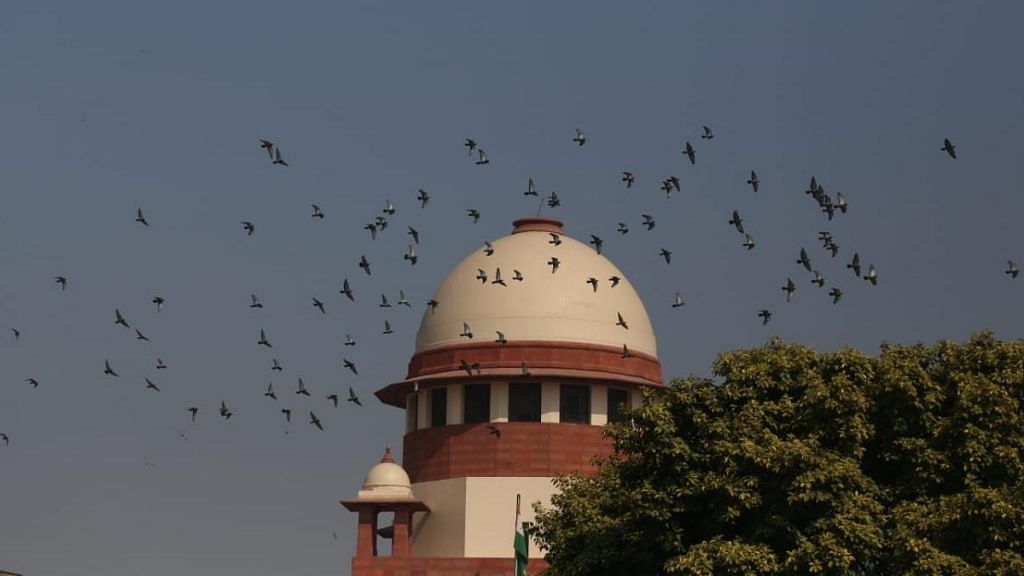New Delhi: The Supreme Court Thursday extended its 3 September order on loan moratorium, saying accounts that have not been declared non-performing assets (NPAs) as on 31 August cannot be declared as such until further notice. The interim order will continue until the next hearing on 28 September.
A bench led by Justice Ashok Bhushan also gave over two more weeks to the Narendra Modi government to decide on waiver of interest for the moratorium period, observing it was keen to do so as the court saw it as a penal interest.
The bench was hearing a batch of petitions seeking waiver of interest on deferred EMIs during the moratorium period, which was introduced by the Reserve Bank of India (RBI) in March to ease the burden on existing borrowers due to Covid-19-related restrictions.
Solicitor General Tushar Mehta informed the court that the government has formed an expert committee at the highest level to take a decision on the issue of moratorium extension, interest during moratorium, interest or interest and other related issues. He said he needed time to file a comprehensive affidavit on the decisions taken so far.
Acceding to Mehta’s request, the bench asked him to place all decisions taken by the RBI or the banks before it for further consideration.
“A decision must be taken after considering the interest of all classes of creditors and all the sectors of the economy,” the court told Mehta.
Initially the bench was keen to pass an interim order, but it refrained from doing so after the Centre and banks’ association impressed upon the judges against it.
Also read: ‘Data rich’ and looking for loan? Niti Aayog’s new data-sharing framework could help
Working on ‘holistic’ solution
Mehta submitted that the Modi government and the RBI were working on a “holistic” solution to the problem, aimed at revival of the economy.
Lawyers appearing for the petitioners, including some belonging to the real estate sector, insisted on issuance of interim orders for protection. However, Mehta asserted and convinced the court from not doing so.
“On concerns expressed on the last date, two or three rounds of meetings have taken place and the issue has been examined. Considered decisions have to be taken in consultation with the banks as banks will play a vital role,” he argued, seeking more time to draw up a resolution plan.
When Mehta commented that the petitioners have taken an adversarial stand, the bench asked him not to say so. “All of us are here to find some solution to this,” Justice Bhushan said.
Mehta, however, pointed out to the “adversarial” arguments, worried that such a stand would prejudice not only various sectors but would also have devastating consequences.
According to him, RBI’s 8 August notification, permitting lenders to allow moratorium of up to two years, is already easing the burden on repayment on various classes of borrowers.
‘All borrowers are suffering’
Senior advocate C.A. Sundaram, appearing for one of the petitioners, complained that the banks had started debiting already, saying there is no moratorium.
Senior advocate Kapil Sibal, representing a body of real estate firms, expressed concern on behalf of the real estate sector. “Downgrading (of the real estate industry) is taking place and RBI has been protecting it,” Sibal submitted.
Senior counsel Rajiv Dutta, arguing for the main petitioner, batted for interim orders, highlighting the troubles of individual borrowers.
“Please remember that people are suffering. It is imperative for the Centre to make a statement on non-charging of interests on interest,” Dutta said.
However, senior advocate Harish Salve urged on behalf of an association of banks to not pass interim orders. To Sibal’s argument on downgrading, Salve said, “Downgrading is based on many factors.” He sought time to seek more instructions to respond to Sibal’s submissions.
Salve said there was no accrual of default interest, but only compound interest. “The entire banking structure works on compound interest and that is what is being done,” he told the bench.
Also read: Govt needs to be scared out of complacency & Q1 contraction could do that, Raghuram Rajan says
